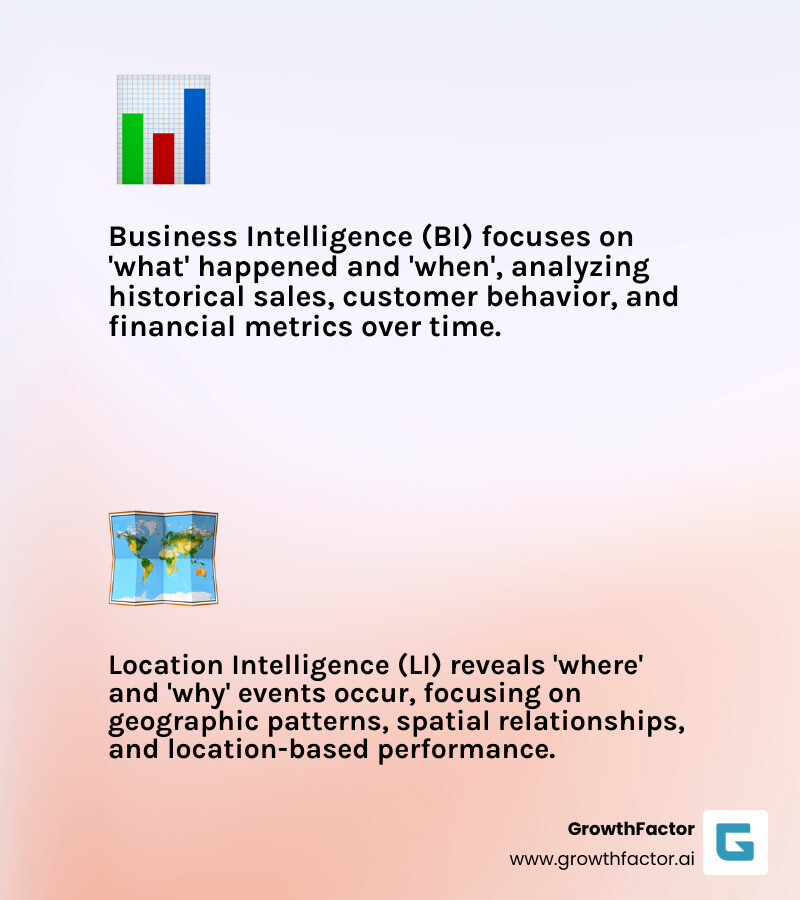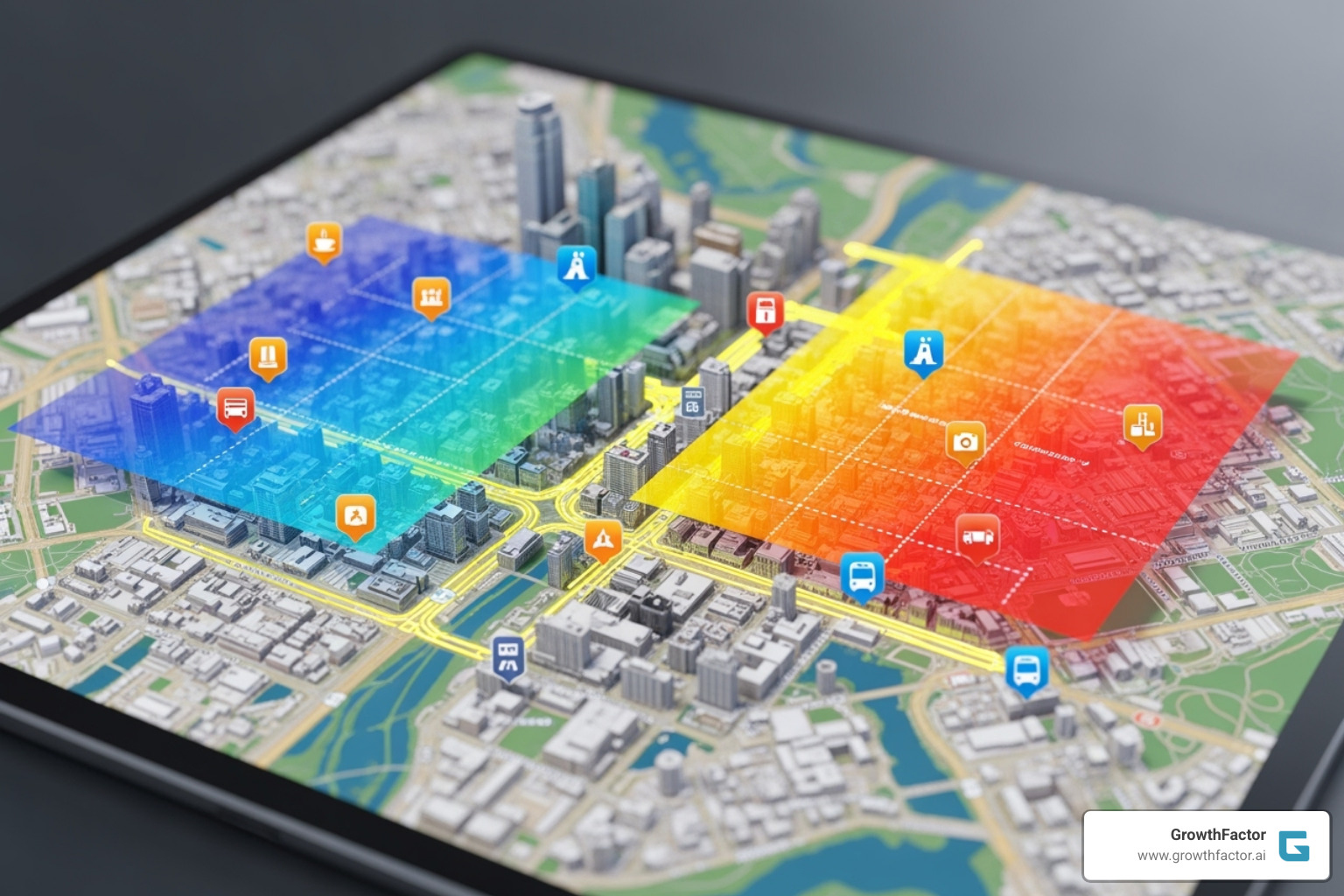Location Intelligence Platform & Tools Guide: Compare Top AI Solutions (2026)
Written by: Clyde Christian Anderson
What is a Location Intelligence Platform?
A location intelligence platform is a software solution that transforms geographic and spatial data into actionable business insights. By combining mapping technology, data analytics, and visualization tools, these platforms help organizations make better decisions based on where things happen.
This concept isn't new. In 1854, physician John Snow famously mapped cholera cases in London to pinpoint a contaminated water pump as the source—a foundational example of location intelligence. Today's retailers face a similar challenge: data-rich spreadsheets that still don't reveal where the next successful store should be.
Key Components of Location Intelligence Platforms:
- Geographic Information Systems (GIS) for mapping and spatial analysis
- Data integration from multiple sources (demographics, foot traffic, POI data)
- Visualization tools like heat maps, drive-time polygons, and interactive dashboards
- Analytics engines for predictive modeling and trend analysis
- APIs and SDKs for custom integrations
Location intelligence differs from traditional business intelligence by focusing on the where and why. While BI analyzes what happened and when, location intelligence reveals the geographic relationships and spatial trends that drive performance. It answers why sales were higher in one neighborhood versus another by analyzing factors like foot traffic, demographics, or competitor proximity.
The global location intelligence market reached $21.21 billion in 2024 and is projected to grow at a 16.8% CAGR through 2030, with 62% of businesses increasing their focus on spatial analytics for a competitive edge.
For retail executives, these platforms streamline site selection by automating data analysis, reducing evaluation time significantly. Instead of spending weeks on manual spreadsheet work, teams can process hundreds of sites in minutes while maintaining high forecast accuracy.
I'm Clyde Christian Anderson, founder of GrowthFactor.ai, where we've helped retail clients achieve significant growth through data-driven location intelligence platform solutions. Cavender's Western Wear grew from 9 to 27 locations using our platform, while Books-A-Million saves 25 hours per week on site analysis. Having worked in retail real estate and experienced the frustration of manual site selection firsthand, I understand the critical role these platforms play in accelerating profitable expansion.

The foundation of any good platform is its ability to harness geospatial data—rich, multi-layered information describing objects and events on Earth's surface. This includes location, attributes (like population density), and temporal changes. Data sources are vast, ranging from satellites and LiDAR to cell phones and census data, fueling the power of location intelligence.
Location Intelligence vs. Business Intelligence
While traditional Business Intelligence (BI) focuses on what has happened and when, location intelligence adds the critical dimension of where and why. Think of it this way: BI might tell you that sales dropped by 10% last quarter, but location intelligence will show you where those sales dropped and, crucially, help you understand why—perhaps due to a new competitor nearby, changing demographics, or a shift in local foot traffic patterns.
| Dimension | Traditional Business Intelligence (BI) | Location Intelligence (LI) |
|---|---|---|
| Data Focus | What happened, when, how much | Where something happened, why it happened there, and its spatial context |
| Analysis Type | Historical trends, performance metrics, financial reports | Spatial patterns, geographic relationships, proximity analysis, predictive spatial models |
| Key Questions | "What are our top-selling products?" "When did our revenue peak?" | "Where are our best customers located?" "Why is this market growing?" |
| Primary Output | Dashboards, charts, tables, reports | Interactive maps, heatmaps, spatial dashboards, geovisualizations |
| Decision Impact | Operational efficiency, financial planning, sales forecasting | Site selection, market expansion, logistical optimization, risk assessment |
| Core Technology | Data warehouses, ETL tools, reporting software | Geographic Information Systems (GIS), spatial databases, geocoding engines |
| Value Proposition | Understanding past performance and current state | Understanding the spatial context of performance, predicting future location-based outcomes |
Core Capabilities to Look for in a Modern Location Intelligence Platform
When you're shopping for a cutting-edge location intelligence platform, you're seeking a comprehensive solution that transforms raw geographic data into actionable business insights that drive real results.
Data Sources and Data Enrichment

A powerful location intelligence platform must integrate data from multiple sources. It should seamlessly blend your first-party data (sales records, customer addresses) with rich third-party data for deeper context.
Key third-party datasets include:
- Points of Interest (POI) data to map the competitive landscape and local amenities.
- Foot traffic data to reveal how people move through physical spaces.
- Demographic data to align locations with target customers based on age, income, and lifestyle.
- Real estate data for property values, zoning, and commercial availability.
Data enrichment is the process of combining these datasets to reveal hidden patterns. For example, layering your sales data with local foot traffic patterns helps explain why certain stores outperform others. High data accuracy and continuous updates are essential, as insights are only as good as the data they're built on. For businesses focused on Data-Driven Site Selection, precise and current information is critical for making confident decisions.
Geospatial Analysis and Visualization Tools

Robust geospatial analysis and visualization tools are essential for interpreting integrated data. Spatial analysis identifies patterns and trends in geographic data, revealing how proximity to amenities or customer density impacts sales.
Key visualization tools include:
- Heat maps to show "hot spots" of customer concentration or optimal demographics, turning spreadsheets into instant visual opportunities.
- Drive-time polygons to create realistic market boundaries based on travel times, which is more accurate than simple radius circles.
- Territory mapping to define and manage sales or service areas.
- Interactive dashboards to tie everything together, allowing for dynamic data exploration, real-time decision-making, and easy sharing of insights.
These tools work in concert to reveal where and why things happen. Layering foot traffic with demographic data, for instance, clarifies potential customer bases for Store Location Analytics. Key trends in the field include cloud integration for scalability and low-code tools that empower more team members to perform spatial analysis.
The Role of AI and Machine Learning in a Location Intelligence Platform

AI and Machine Learning lift a location intelligence platform from descriptive to predictive. These technologies forecast future trends, helping you make proactive decisions.
Predictive analytics uses historical data to forecast site performance and market shifts. AI-powered insights and machine learning models sift through massive datasets to identify complex patterns, automate routine tasks, and improve accuracy over time. The rise of natural language queries makes platforms more intuitive, allowing users to ask complex questions in plain English.
At GrowthFactor, we leverage AI to give our clients a competitive edge. Our AI Agent Waldo enables teams to evaluate five times more sites by automating qualification and evaluation processes that once took weeks. This allows clients to identify high-potential locations and track deals with unprecedented speed and accuracy.
Applying AI for spatial analytics is essential for staying competitive. It shifts decision-making from gut feelings to data-driven solutions that provide real advantages. This is the future of AI Location Intelligence and is especially impactful for AI for Real Estate.
Types of Location Intelligence Tools
Location intelligence platforms come in several categories, each suited to different needs:
- Data Visualization and Mapping Platforms: Best for businesses starting their location intelligence journey. These tools transform spreadsheets into clear, actionable maps with user-friendly, drag-and-drop interfaces. Features like heat maps, territory mapping, and route optimization provide immediate insights from existing data.
- Advanced GIS and Spatial Analytics Suites: Designed for complex spatial questions and serious analysis. Capabilities include overlay analysis to see how different data layers interact, network analysis to optimize transportation, and predictive modeling to forecast spatial trends.
- AI-Powered Predictive Analytics Platforms: The newest generation uses artificial intelligence and machine learning to predict future outcomes. These can forecast foot traffic for potential retail sites, perform market gap analysis, and generate revenue forecasting based on dozens of spatial factors.
- Developer-Focused APIs and SDKs: For businesses that need to integrate location intelligence directly into their own applications. These provide maximum flexibility for creating custom maps, embedding spatial analysis, and implementing geofencing and geotargeting features.
Industry-Specific Use Cases and Applications
A robust location intelligence platform offers valuable insights across numerous industries.
- Site selection: Our specialty at GrowthFactor is helping retail, restaurant, and healthcare clients identify optimal locations by analyzing foot traffic, demographics, and competitor presence. Our platform supports confident, data-driven decisions for Retail Store Site Selection.
- Supply chain and logistics: This sector uses location data for route optimization, fleet management, and eliminating production bottlenecks, capturing 19.4% of the location intelligence market.
- Marketing: Understanding where target customers live and work enables effective location-based advertising for higher ROI.
- Real estate market analysis: Professionals use location intelligence to understand market trends, assess property values, and identify investment opportunities. Learn more about Real Estate Location Intelligence.
- Finance and insurance: Banks use location intelligence for branch optimization and market penetration analysis. Insurers leverage it for risk assessment based on flood zones, crime rates, and hazard proximity. Both sectors use it for fraud detection through geographic pattern analysis.
- Healthcare and public sector: Location intelligence helps plan service delivery, track disease outbreaks, coordinate emergency response, inform urban planning, and manage infrastructure based on population patterns.
- Risk assessment and competitive analysis: Applications include evaluating natural disaster risk for insurance and analyzing competitor locations to find underserved markets.
How to Choose the Right Location Intelligence Platform
Selecting the right location intelligence platform is a critical decision. It's not a one-size-fits-all solution, so evaluate these key factors:
- Scalability: Can the platform handle your current data volume and grow with your business?
- Integration capabilities: Does it connect easily with your existing CRM, ERP, and BI tools via APIs for seamless data flow?
- Ease of use: Is the interface intuitive for team members without a GIS background?
- Low-code vs. developer-focused: Does it empower business users with no-code options, or does it require coding for customization?
- Total cost of ownership: Consider the initial subscription plus implementation, training, and support costs. GrowthFactor offers Starter ($200/mo for growing retailers under 10 locations), Core ($1,000/mo for expanding retailers), and Enterprise (custom) plans.
- Vendor support: Does the provider offer comprehensive customer support and training?
For retail, focus on how well the platform addresses your unique site selection challenges. We offer more insights on How to Choose Retail Location. The right platform will streamline workflows and drive revenue growth.
Implementation Strategy and Common Challenges
Implementing a location intelligence platform is a strategic initiative requiring careful planning.
First, define clear business goals (e.g., optimize site selection, improve marketing ROI) and establish measurable ROI metrics to track success. Develop a data integration strategy to connect your data sources and ensure comprehensive team training so everyone can use the platform effectively.
Common implementation challenges and how to overcome them:
- Data quality and availability: Inaccurate or outdated geospatial data leads to flawed insights. Implement robust data validation processes and leverage reliable data providers.
- Data integration: Geospatial data from disparate systems requires strong data engineering capabilities and flexible platforms that handle various data types.
- Privacy concerns: Compliance with GDPR, CCPA, and similar regulations is paramount. Use anonymization and aggregation of data as key strategies.
- Technical expertise gap: Bridge this by investing in training, hiring skilled analysts, or partnering with experts who understand your industry.
- Computational complexity: Cloud-based GIS platforms and advanced processing capabilities help manage the demands of analyzing massive geospatial datasets in real-time.
Ethical considerations are paramount. Data privacy must be protected through anonymization and aggregation. Ensure your platform and data sources are compliant with regulations. We recommend clients add a basic privacy policy to their websites for transparency. Practice ethical data sourcing by ensuring all geospatial data is obtained legally and with proper consent.
Comparing Top Location Intelligence Platforms in 2026
The location intelligence market offers diverse options depending on your use case. Here's how the leading platforms compare:
| Platform | Best For | Key Strengths | Pricing |
|---|---|---|---|
| GrowthFactor | Retail and CRE site selection | Glass box AI scoring (transparent), no seat limits, expert analysts on-demand, same-day deployment | Starter $200/mo, Core $1,000/mo, Enterprise custom |
| Esri ArcGIS | Enterprise GIS needs | Comprehensive mapping and spatial analysis, industry standard | $10,000–$100,000+/year depending on modules |
| Placer.ai | Foot traffic analytics | Strong visitor analytics, good for retail foot traffic data | $1,000–$5,000/month |
| CARTO | Custom spatial analytics | Cloud-native, developer-friendly APIs, strong for integrations | Starting around $3,000/month for professional plans |
| SafeGraph | POI and foot traffic data | High-quality points of interest data, often used as data source | Varies by data volume |
What Makes GrowthFactor Different?
| Feature | GrowthFactor | Traditional GIS (Esri) | Foot Traffic Tools (Placer.ai) |
|---|---|---|---|
| Primary Focus | Retail and CRE site selection | General-purpose mapping | Visitor analytics |
| AI Scoring | Glass box (transparent—see exactly why each site scores high or low) | Limited AI capabilities | Basic predictive |
| Seat Limits | None (unlimited users) | Per-user licensing | Per-user licensing |
| Expert Support | On-demand analysts | Technical support only | Account management |
| Setup Time | Same-day deployment | Weeks to months | 1-2 weeks |
| Custom Models | Per-brand scoring | DIY configuration | Limited customization |
| Proven Results | Cavender's grew 9→27 stores; BAM saves 25 hrs/week | Varies by implementation | Traffic insights only |
Customers like Cavender's Western Wear (grew from 9 to 27 locations) and Books-A-Million (saves 25 hours per week per user on site evaluation) chose GrowthFactor for its combination of AI-powered insights, transparent scoring, and hands-on expert support.
The Future of Location Intelligence and Your Competitive Edge
The world of location intelligence platforms is evolving rapidly. We're seeing a fundamental shift toward cloud-native platforms that offer unprecedented scalability and flexibility, allowing businesses to seamlessly integrate geospatial capabilities into their existing cloud ecosystems.
The rise of geospatial AI agents is another thrilling development. These personal location intelligence assistants—much like our own AI Agent Waldo—understand natural language questions and provide instant spatial insights. Instead of spending hours in dashboards, you can ask, "Where should I open my next store?" and get a comprehensive analysis in minutes.
Other key trends include hyper-personalization, which uses real-time location patterns to tailor offerings to individuals, and sustainability analysis, which helps businesses monitor environmental factors and plan sustainable development. Digital twins—virtual replicas of physical assets or entire cities—represent another frontier, combining real-time data with spatial analysis to create living simulations for planning and optimization.
At GrowthFactor, we're not just watching these trends; we're shaping them. Our Waldo - The AI Agent for Retail Site Selection and Report Building embodies this future. Waldo enables our clients to evaluate five times more sites efficiently by automating qualification and evaluation processes that used to take weeks.
This translates directly into measurable operational efficiency. Making real estate decisions in minutes instead of weeks gives you a powerful competitive advantage. Businesses that invest in cutting-edge location intelligence platforms today are positioning themselves to dominate their markets tomorrow by spotting opportunities and optimizing operations while competitors struggle with manual processes.
Partnering with us means investing in a smarter, more efficient future for your business. We use the power of "where" to open up unlimited growth potential.
Frequently Asked Questions About Location Intelligence Platforms
What is the best location intelligence platform in 2026?
The best location intelligence platform depends on your use case. For retail site selection, GrowthFactor leads with AI-powered analysis and transparent "glass box" scoring. Esri ArcGIS excels for enterprise GIS needs. Placer.ai focuses on foot traffic analytics. CARTO offers cloud-native spatial analytics with developer-friendly APIs. SafeGraph provides high-quality POI and foot traffic data. GrowthFactor differentiates with no seat limits and expert analysts on-demand—helping retailers like Cavender's grow from 9 to 27 new locations with confidence.
How much does a location intelligence platform cost?
Location intelligence platform pricing varies widely. Enterprise GIS solutions like Esri can cost $10,000-$100,000+ annually. Foot traffic platforms like Placer.ai range from $1,000-$5,000/month. GrowthFactor offers accessible entry points: Starter at $200/month for growing retailers under 10 locations, Core at $1,000/month for expanding retailers, and custom Enterprise plans for large organizations.
What features should I look for in a location intelligence platform?
Key features include: (1) Multiple data sources - foot traffic, demographics, POI, and real estate data; (2) AI-powered predictions - machine learning models that forecast site performance; (3) Visualization tools - heat maps, drive-time polygons, interactive dashboards; (4) Integration capabilities - APIs connecting to your CRM and BI tools; (5) Ease of use - intuitive interface for non-GIS users; (6) Transparency - can you see exactly why a site scores high or low? GrowthFactor's glass box approach lets you understand and trust the scoring logic.
How does AI improve location intelligence for retail?
AI transforms location intelligence from descriptive to predictive. Machine learning models analyze thousands of variables—foot traffic patterns, demographic trends, competitor proximity—to forecast site performance before you sign a lease. GrowthFactor's AI Agent Waldo enables teams to evaluate 5x more sites by automating qualification processes that once took weeks. This shifts decision-making from gut feelings to data-driven insights with measurable accuracy.
What is the difference between location intelligence and business intelligence?
Business intelligence (BI) analyzes what happened and when—sales trends, financial metrics, customer behavior over time. Location intelligence focuses on where and why—geographic patterns, spatial relationships, and location-based performance factors. While BI tells you sales increased 15%, location intelligence reveals why: proximity to anchor tenants, demographic shifts, or competitor closures. The most powerful insights come from combining both.
What kind of data is used in location intelligence?
Location intelligence combines multiple data types to create a complete picture. Key sources include: Geospatial data (coordinates, addresses, boundaries), demographic data (population, income, age from census sources), foot traffic data (anonymized data showing visitor patterns), points of interest (POIs) (businesses, landmarks, amenities), transactional data (your sales records linked to location), and environmental data (weather, land use, IoT sensors).
What is the role of GIS in location intelligence?
If location intelligence is the business application, Geographic Information System (GIS) is the powerful engine that runs it. GIS is the foundational technology for capturing, storing, analyzing, and visualizing vast amounts of spatial data. Modern location intelligence platforms make these powerful GIS capabilities accessible to business users through user-friendly interfaces, removing the need for specialized GIS expertise.
What are some real-world use cases for location intelligence?
Location intelligence is transforming decision-making across industries: Retail site selection (analyzing demographics, competition, and foot traffic), supply chain optimization (optimizing delivery routes and warehouse placement), targeted marketing (delivering location-based ads), emergency response (allocating resources during crises), urban planning (infrastructure projects and zoning), real estate investment (property values and market trends), telecommunications (network coverage planning), and insurance (evaluating property risk based on geographic factors).
Ready to see how our platform can transform your site selection process? Explore our solutions designed specifically for site selection teams and discover how we can help you navigate the future of retail real estate with confidence and precision.
Citations
The human algorithm
Request Your demo
Schedule meeting
Or submit your information below and we'll be in touch to schedule.



